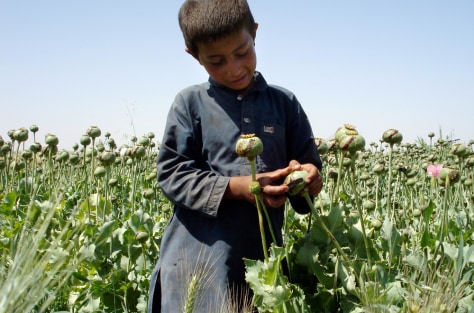Wednesday, November 12, 2014
Afghan Opium on the Rise
United Nations officials reported that Afghan opium cultivation and production has reached new highs in 2014. According to the UN and Afghan Ministry of Country-Narcotics, Afghan opium cultivation had increased by 7 percent over 2013, while production had increased as much as 17 percent. The increase in production and cultivation is somewhat surprising as demand for Afghan opium has stagnated dropping prices for farmers. Nonetheless, agencies find these numbers worrisome because 2013 opium cultivation increased by 49 percent over 2012.
What was some of this money funding? Elections. A senior UNODC official said "with the presidential election ongoing there was a huge demand of funding...and that funding is not available in the licit economy, and that money has to come from somewhere, so they turned to the illicit economy." The presidential election not only demanded money from opium production but diverted police and military resources from opium eradication to focus on election violence. Officials are optimistic that President Ghani will work to help eradicate opium: "He understood well that drug trafficking suffocates the normal economic development...we are quite optimistic."
A report published last month by the U.S. Special Inspector General for Afghanistan Reconstruction stated that opium cultivation continues to rise even though the US is spending $7.6 billion on counter-narcotics efforts. The UN agreed that this is a huge problem and that there are ongoing efforts to find a better method to solve the problem rather than just the symptoms. Alternative efforts to get farmers to plant other crops have not been successful either. The lure of opium money in one of the world's poorest countries will continue to attract farmers until the legal economy can offer substantial alternatives. The drug trade is central to the Afghan economy; roughly equivalent to 20 percent of the country's GDP, it indirectly employs over 400,000 people - more than Afghanistan's armed forces.
Rising opium production has the potential to increase corruption within the Afghan government. President Ashraf Ghani will have his hands full keeping his campaign promise of fighting that corruption should opium cultivation and production continue to rise during his term. He has already begun fighting graft by reopening investigations into the Kabul Bank case, a commercial bank that collapsed after media allegations of massive high-level corruption and misappropriation of more than $900 million. Only time will tell if his efforts during his term in office will produce enough results to help place Afghanistan on a positive trajectory.
Subscribe to:
Post Comments (Atom)




No comments:
Post a Comment